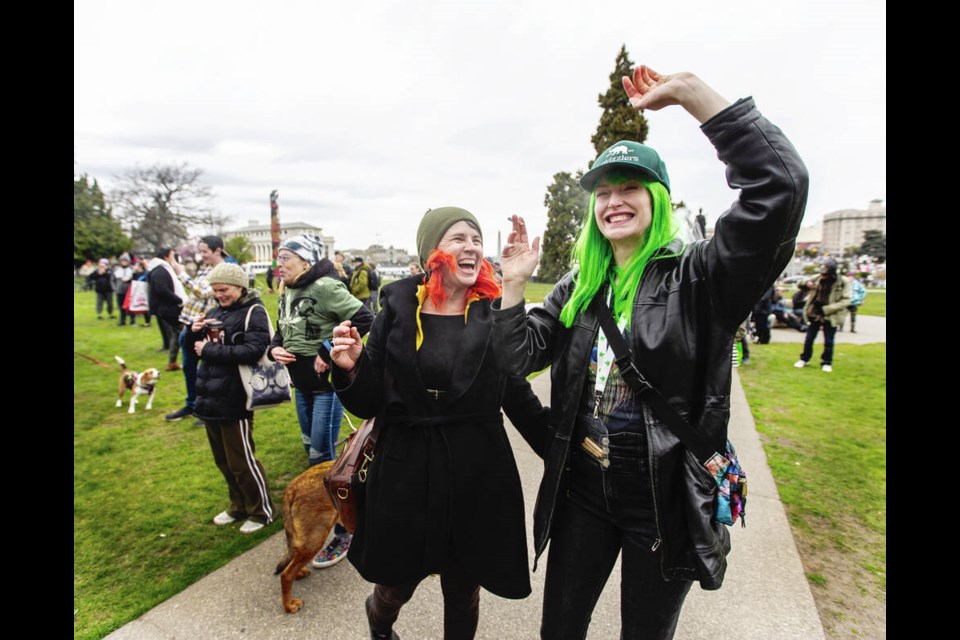This is not your father’s 4:20.
Back in the olden days, when marijuana possession was not yet legal but might as well have been, advocates treated the event like a celebration.
In 2015, not even the cloud of smoke hanging over Centennial Square (it was so thick that they had to shut the windows and air intakes at city hall) could obscure the sunshine. The square was packed for the annual light-up — music, tents, flags, banners, a costume contest with bongs as prizes. The crowd was ebullient.
By 2016, the smoke from 4:20 rivalled that of the barbecues at Ribfest. Pound for pound (or gram for gram), Victoria was the Pot Shop Capital of Canada. With 32 dispensaries, it had more per capita than even Vancouver. Legalization was on its way.
Fast forward to Wednesday in front of the legislature. A smaller-than-normal crowd, maybe 200 people, lit up at 4:20 p.m. for Victoria’s first such event in two years, though this time the smoke had to compete with the February-in-April gloom. This was more protest than celebration.
It seems that 3 1/2 years after Canada dropped its prohibition on pot, the Great Green North isn’t the nirvana some hoped it would be. Retailers are still fighting red tape and the black market. Medical-marijuana users still don’t have easy access to the products they want. Up at the, er, higher levels of the business, Big Bud has not been the gold mine investors dreamed of when The Fabulous Furry Freak Brothers (or at least their Canadian equivalent, Harold Hedd) and their Grateful Dead T-shirts made way for the guys in the suits and ties.
The landscape, over-regulated and over-saturated, needs work, argues Ted Smith.
Smith, the founder of the Victoria Cannabis Buyers Club, has spent more than a quarter-century at the forefront of a high-profile and well-documented push to change medical-marijuana laws. It’s that fight that has landed him in hot water, again, with the authorities.
The non-profit club sells edibles and other products, usually at strengths higher than permitted by federal regulations, to members (there are 8,500 names on the list) dealing with conditions ranging from anxiety to cancer. That contravenes Health Canada rules that require medical users to get their cannabis products mailed from a licensed source, and only after getting a doctor’s approval. In February, Smith and the club were fined a total of $6.5 million.
Smith has vowed to fight in court (on Wednesday he took pies in the face to raise money for legal bills), arguing that high-cost, low-strength products, when combined with barriers to access, deny sufferers what they need.
In the meantime, the club, which has operated openly since 1996, reopened the smoking room in its Johnson Street storefront April 8.
This is just one ongoing issue. The recreational-use sector, the people who jumped through the hoops to get licensed after legalization in 2018, still face unlicensed competition. In June 2020, an analysis posted on the Public Safety Canada website found the black market was proving hard to snuff out.
“For example, in British Columbia less than 40 per cent of cannabis users report obtaining cannabis from the legal market,” it read. “Consumers are turning to the black market for a variety of reasons, including but not limited to: higher prices, limited selection and a scarcity of licensed stores in their area. According to Statistics Canada a gram of legal cannabis costs 55 per cent more than illicit cannabis.”
The teeter totter might be tilting, though. In November, Business in Vancouver cited Statistics Canada numbers showing Canadians had spent almost $1.4 billion in the legal market and $1 billion in the black market in the second quarter of 2021. Smith says the gap in cost and quality between the legal and unlicensed recreational markets has closed in the past year. “The prices of bud in the legal market have come down substantially.” He knows of black market growers who are pulling the plug.
Still, retailers must contend with an overcrowded field and with the kind of regulations the liquor industry does not, he says. “The alcohol industry can have a beer fest and advertise it,” Smith says. The cannabis industry can’t. That’s just one example.
Overall, he says, there’s too much bureaucracy and too much competition for those who waded into the legalized world.
Not sure this is what they had in mind at 4:20 in the olden days.




